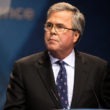(Rand Paul | Source: Creative Commons)
Rand Paul’s principled stance against the National Security Agency’s domestic spying (he’s called its overreach “fundamentally unconstitutional“) has lifted his presidential prospects—even as the mainstream of the GOP, which New Jersey Governor Chris Christie is also vying to represent, remains considerably more hawkish than he is.
Christie has characterized “the strain of libertarianism that’s going through both parties right now and making big headlines” as “very dangerous.” Though libertarianism, especially its so-called “populist” incarnation, has captured far more Republicans than Democrats, its rejection of neoconservativism’s aggressive national-security vision may make it the only strain of Republican thinking that crosses party lines—or eludes them altogether.
Last week, Wikileaks founder Julian Assange counted himself “a big admirer of Ron Paul and Rand Paul for their very principled positions in the U.S. Congress on a number of issues,” adding that, “The Libertarian aspect of the Republican Party is presently the only useful political voice in the U.S. Congress.”
| Ron and Rand Paul’s ideological views on NSA leaker Edward Snowden and a host of issues are coherent and morally defensible but they are staked out midway down a slope that is very slippery indeed. |
As is well known, Edward Snowden—who both Harry Reid and John Boehner have called a “traitor”—is a Ron Paul supporter as well. Both Pauls have returned the favor, the retired Texas Congressman by calling him a hero, the Kentucky senator by reserving judgment on his law-breaking until history has its say.
The last time Rand Paul was riding this high—immediately after his election to the Senate—he was embarrassed by questions about his stance on the Voting Rights Act of 1965. This summer, he was discomfited by a story in the right-wing Washington Free Beacon about Jack Hunter, the co-author of his 2010 book The Tea Party Goes to Washington, who had been affiliated with the neo-secessionist group The League of the South.
Blogging as The Southern Avenger back in 2004, Hunter wrote that Abraham Lincoln was not only the worst president the U.S. ever had, but “one of the worst figures in American history,” adding that, “If you are a patriotic American who believes in the ideals of Thomas Jefferson, Patrick Henry and George Washington—then you cannot at the same time honor Abraham Lincoln. That’s like praising Jesus and worshipping Satan simultaneously.” Hunter resigned from his job as Paul’s social media director on July 22.
The senior Paul, of course, has his own awkward affiliations too, most notably his long-standing connection to Lew Rockwell. Rockwell is not only reputed to have written the racist newsletters that went out in Paul’s name decades ago, but currently sits on the advisory board of the Ron Paul Institute for Peace and Prosperity. He is not just an energetic proponent of Austrian School economics but shares Hunter’s dim view of Lincoln. As Rockwell put it, the Civil War “was about the principle of self-determination and the right not to be taxed to support an alien regime … the war was about freedom, and the South was on the same side as the original American revolutionaries.” Ron Paul himself famously called the Civil War a “senseless” conflict that Lincoln undertook “just to enhance and get rid of the original intent of the republic. I mean, it was that iron fist.”
From libertarianism to neo-secessionism
Correlation is not causation, of course, but it nonetheless raises the question.
Is there a more than casual relationship between neo-secessionism and libertarianism?
Yes, says Will Wilkinson, a former research fellow at the Cato Institute and self-described ex-libertarian. Writing for The Economist, he argued that “right-wing populism in America has always amounted to white-identity politics, which is why the only notable libertarian-leaning politicians to generate real excitement among conservative voters have risen to prominence through alliances with racist and nativist movements.”
This isn’t because libertarianism is intrinsically racist, Wilkinson explains. It’s because the “Republican Party is the party of the rich, as well as the ideological champion of big business.” Libertarianism’s anti-corporatism might not be popular with the party’s donor class, but it resonates with the disaffected working-class whites whose votes it also needs (even if libertarian policies would hurt them economically). A handful of anti-elitist libertarian ideas have “functioned historically with some effectiveness as a stalking horse for white identity politics.”
This raises another question.
Does libertarianism’s penchant for neo-secessionism have any bearing on how it construes the word “treason?”
“Dissenters who tell their fellow citizens what is really going on are subject to smear campaigns that, like clockwork, are aimed at the political heretic,” Ron Paul wrote in The Revolution: A Manifesto. “Truth is treason in the empire of lies.”
For the Pauls, constitutionalism is the antidote to the evils of statism, but by constitutionalism, they don’t mean the sovereignty of the nation’s written law so much as they do a federal government whose powers are strictly circumscribed by it.
The real antinomy is between Thomas Jefferson’s and Alexander Hamilton’s competing visions of a decentralized agrarian republic versus a centralized, regulated industrial state. It’s no accident that Thomas DiLorenzo, whom the Southern Poverty Law Center has identified as a long-time activist in The League of the South, hailed Ron Paul as the “Jefferson of our time.”
The Pauls both insist that they are not racists; perhaps they are not. Yet as Jonathan Chait has noted, “the logic of southern white supremacy and the logic of libertarianism run along very similar lines. They both express themselves in terms of opposition to federal power and support for states’ rights.”
Follow that line of thinking far enough and you’ll leave even Jeffersonianism far behind.
From neo-secessionism to “treason”
In the course of a speech on the necessity of a white “ethnostate” at the National Policy Institute’s 2011 convention in Washington, D.C., Sam Dickson, the eloquent attorney, board member of the Council of Conservative Citizens, and white nationalist, remarked that despite his centuries-long American lineage and his personal history as a Goldwater Republican, he could no longer describe himself as a patriot.
“Because of the infection of French Enlightenment ideals at the foundation of our country,” he said, “it was my fate … to be born without a country.”
For Dickson, the best state is not the one that governs least, but the one that supports and promotes the interests of his racial tribe the most assiduously.
“I do not think we can save America,” he continued. “Really, a book could be written and will be written called America: The God That Failed. Because we’re seeing in America … the failure of the idea that the individual is more important than society, that the part is more important than the whole.”
Of course neither of the Pauls has said anything remotely like that—and Dickson is one neo-secessionist who did not endorse Ron Paul, but rather warned of the impotence implicit in his libertarian values.
He has said: “Many American conservatives, Southerners in particular, find the doctrines of States’ Rights and decentralized government very attractive. But these very doctrines played a major and a decisive role in insuring the defeat of the South in the Civil War.”
In the unlikely event that Ron Paul won the presidency, he warned, “he would be lucky to avoid impeachment or assassination. And, as a libertarian, his own principles would prevent him from doing anything about it.”
The Pauls’ stances on Snowden and the NSA, on drugs, and a host of other issues are far more coherent and morally defensible than those of the Obama administration.
But the ideological place they have staked out is midway down a slope that is very slippery indeed.
Arthur Goldwag is the author of Isms & Ologies; Cults, Conspiracies, and Secret Societies, and most recently The New Hate: A History of Fear and Loathing on the Populist Right. He lives in Brooklyn with his wife and two children. Follow him at @ArthurGoldwag.







0 Comments